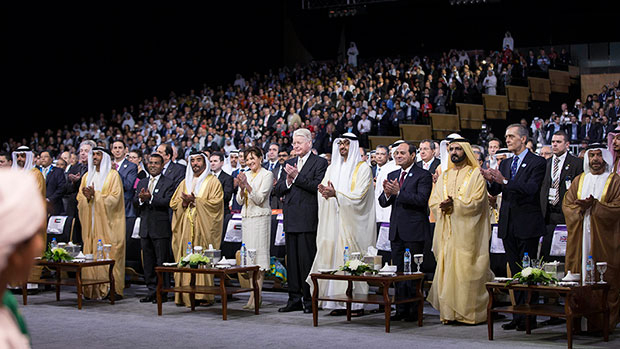
Abu Dhabi: Falling oil prices are an opportunity to revisit fossil fuel subsidies that cost the world $550 billion (Dh2,020 billion) in 2013, which can otherwise be used to transform economies by creating jobs, the Abu Dhabi Sustainability Week heard on Monday.
The global energy landscape has evolved to prevent oil price fluctuations from affecting the deployment of clean energy, an official said at the opening ceremony of the global events including the World Future Energy Summit 2015.
The weeklong event that started on Saturday was formally inaugurated on Monday in the presence of His Highness Shaikh Mohammad Bin Rashid Al Maktoum, Vice President and Prime Minister of the UAE and Ruler of Dubai.
General Shaikh Mohammad Bin Zayed Al Nahyan, Crown Prince of Abu Dhabi and Deputy Supreme Commander of the UAE Armed Forces, who also attended the opening ceremony, awarded the winners of the prestigious Zayed Future Energy Prize.
Egyptian President Abdul Fattah Al Sissi received the first honorary award of the Prize for his commitment to clean energy.
Al Gore, former US vice-president and chairman of the Climate Reality Project, received the Lifetime Achievement Award for his contributions towards clean energy and sustainability.
Egyptian President Al Sissi who addressed the ceremony vowed to make Egypt an economic hub and promised to bring in comprehensive reforms in the subsidies in the next five years to get the country’s economy back on track.
“We will expand our reliance on renewable energy to 20 per cent 2020. There are successful wind and solar energy projects in Egypt. We are taking on one of the most ambitious projects in the region — to install 4,300 megawatts of solar and wind power plants in Egypt over the next three years,” he said.
Al Sissi said the country is developing a unified investment road map and would be highlighted during an economic forum in Sharm Al Shaikh in March.
“Egypt seeks to develop an energy strategy. We seek to realise reforms and diversification of traditional energy used in power plants.”
On issues confronting the Arab world, he said Arab nations have to be careful.
“You have to take care of your nations and countries. We are destroying ourselves. The largest [group of] refugees in the world are Arabs,” Al Sissi said.
Speaking at the ceremony, Sultan Ahmad Al Jaber, UAE Minister of State and Chairman of Masdar, said that with oil prices at a five-year low there is an opportunity to revisit fossil fuel subsidies, especially in countries where subsidies have become a heavy financial burden for their economic development.
In 2013, fossil fuel subsidies cost countries $550 billion dollars (Dh2 billion), he said.
“[This is] money that can otherwise be redirected to improve energy systems and transform economies by creating jobs, stimulating economic growth and educating future generations,” Al Jaber said.
The world’s interconnected energy landscape had “evolved beyond the point where oil price fluctuations result in reduced deployment of clean energies”.
“We have seen investments in clean energy rise by 16 per cent to $310 billion (Dh1,138 billion). And installations of solar and wind increase by 26 per cent to 100 gigawatt”
Al Jaber said this growth has been driven by the sharp decline in costs and the steady rise in technology efficiency.
Gore, while receiving the award, said he was impressed with the UAE’s efforts, including its solar energy projects and developments at Masdar.
“Now is a moment of danger and inspiration. We have everything we need [to limit climate change], except political will. But political will itself is a renewable resource,” he added.
International Water Summit and EcoWaste, a conference on waste management, which begin on Tuesday are also part of Abu Dhabi Sustainability Week.












